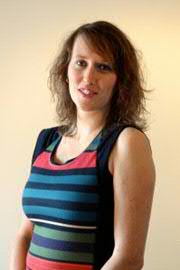Secular Citizinship?
Despite the Dutch history of freedom of religion and tolerance, the role of religion in the public domain has recently been under increasing pressure, in particular where expressions of orthodox religiosity are concerned. In political and social debates, ‘good citizenship’ is increasingly measured in terms of ‘a common national identity’. This focus on national identity may lead to the exclusion of religious citizens. In her PhD research, Renée Wagenvoorde asked what makes a person a good citizen and what elements are essential for citizenship. The crucial question is, what role is religion allowed and able to play in Dutch citizenship? On 17 September, Wagenvoorde will defend. her thesis at the Faculty of Theology and Religious Studies. The thesis, on the relationship between religion and good citizenship, is entitled Is Citizenship Secular? Conceptualising the relation between religion and citizenship in contemporary Dutch society.

Big Five
Renée Wagenvoorde hopes that her PhD research will contribute to a common vision on good citizenship that both religious and non-religious citizens can identify with. In order to achieve this goal, she has created a ‘Big Five’ model of Dutch citizenship. She identifies five dimensions of citizenship: social engagement, political engagement, law abidance, tolerance and shared identity. She argues that ‘The negative stereotyping of religious citizens is linked to a limited definition of citizenship, in which good citizenship only depends on the degree of adherence to Dutch culture, whatever it may be. By showing that citizenship is not a unitary concept, we can create room for diversity. If citizens – religious or non-religious, from ethnic minorities or majorities – fail to appreciate certain “typically Dutch achievements”, this does not automatically make them bad or less good citizens.’
Tolerance and social engagement
On the contrary, the PhD candidate argues, the narrow focus on a shared identity has a counterproductive and excluding effect. ‘Practices such as problematizing the public role of religion (think of debates on ritual slaughter, wearing headscarves, homosexual marriage and so-called weigerambtenaars, that is to say civil servants who refuse to marry homosexual couples) and requiring people to adjust to progressive Dutch values as part of a shared national identity is unlikely to result in religious citizens feeling involved or at home in this country. In order to stimulate their engagement, I propose a broader perspective on citizenship, in which the focus lies on tolerance and social engagement. My research has shown that these two elements are considered by both religious and non-religious citizens as more central to good citizenship than political engagement and a shared identity.’
Retaining religious identity
Based on the results of her research, Renée Wagenvoorde argues that it would be better to abandon the top-down perspective so prominent in modern-day political discourse, in favour of an approach that focuses on tolerance and social engagement, so that citizenship and social engagement can be constructed from the bottom up by the citizens themselves. ‘Once the feeling of Dutch citizenship is seen as a result rather than a condition, and the top-down focus on national identity is replaced by an approach in which social engagement is stimulated and facilitated, religious citizens can maintain, develop and express their religious identity, and in this way make a positive contribution to society. If social engagement is seen as a component of citizenship, religious values – such as charity and stewardship – may well be seen as a component of Dutch citizenship,’ she argues.
Defence
On 17 September Renée will defend her thesis in the presence of her primary supervisor Arie Molendijk, Professor of the History of Christianity and Professor of Theology at the Faculty of Theology and Religious Studies of the University of Groningen.
- When: Thursday 17 September 2015
- Start: 4:15 p.m.
- Where: Academy Building
More news
-
06 January 2026
Connecting with history
